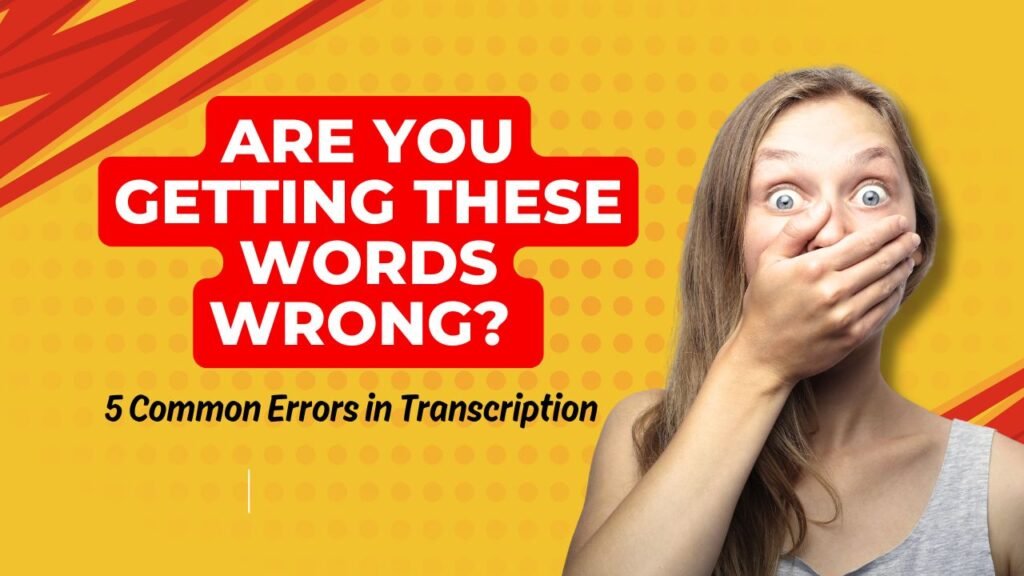AFFILIATE DISCLOSURE
This post may contain affiliate links. An affiliate means Escribr may earn referral fees if you make a purchase through our link without any extra cost to you. It helps to keep this blog afloat. Thanks for your support!
Did you know that by visiting this blog, you are doing good in the world? READ THIS.
Transcription is a skill that requires precision, but even the most experienced professionals can fall into the trap of misused words in transcription. These words often sound alike, making them tricky to catch, yet they carry completely different meanings that can alter the message of a transcript. Whether you’re a beginner or a seasoned transcriber, understanding these common errors is essential for improving accuracy.
In this guide, we’ll dive into five of the most frequently misused words in transcription, complete with examples and tips to help you master them.
1. “Your” vs. “You’re”
These two homophones sound identical but have very different meanings.
- “Your” is a possessive pronoun that shows ownership.
Example: “Is this your laptop?” - “You’re” is a contraction of “you are.”
Example: “You’re doing a great job with this project.”
Common Mistake in Transcription:
Incorrect transcription: “Your right about you’re suggestion.”
Correct transcription: “You’re right about your suggestion.”
2. “Its” vs. “It’s”
This pair trips up even the best writers and transcribers because of its subtlety.
- “Its” is a possessive pronoun, meaning “belonging to it.”
Example: “The dog wagged its tail.” - “It’s” is a contraction for “it is” or “it has.”
Example: “It’s a beautiful day.” / “It’s been a long time since we met.”
Common Mistake in Transcription:
Incorrect transcription: “Its important to check it’s status.”
Correct transcription: “It’s important to check its status.”
3. “Affect” vs. “Effect”
These words sound similar, but their grammatical roles differ.
- “Affect” is usually a verb meaning “to influence.”
Example: “The new policy will affect everyone.” - “Effect” is typically a noun meaning “a result.”
Example: “The new policy had a positive effect.”
Common Mistake in Transcription:
Incorrect transcription: “The medication may effect your mood, but the long-term affect will be positive.”
Correct transcription: “The medication may affect your mood, but the long-term effect will be positive.”
4. “Then” vs. “Than”
Although these words have distinct meanings, they’re often misheard in spoken English.
- “Then” relates to time or sequence.
Example: “We’ll eat dinner, then go for a walk.” - “Than” is used for comparisons.
Example: “She runs faster than I do.”
Common Mistake in Transcription:
Incorrect transcription: “We’ll finish this, than we’ll review it. She’s faster then most of us.”
Correct transcription: “We’ll finish this, then we’ll review it. She’s faster than most of us.”
5. “Accept” vs. “Except”
These words are often confused because they sound very similar but differ in meaning and usage.
- “Accept” means “to receive” or “to agree.”
Example: “I accept your offer.” - “Except” means “to exclude.”
Example: “Everyone is coming except for John.”
Common Mistake in Transcription:
Incorrect transcription: “I can except all the feedback accept for this one point.”
Correct transcription: “I can accept all the feedback except for this one point.”
Why These Words Matter in Transcription
Misusing these words can change the meaning of a sentence entirely. For instance:
- “You’re a great transcriber.” vs. “Your a great transcriber.”
- “It’s working fine.” vs. “Its working fine.”
These small differences can lead to confusion for readers and miscommunication of the original message.
Quick Tips to Improve Accuracy
- Use Context Clues: Pay attention to the overall context of the sentence to determine the correct word.
- Proofread Your Work: Always review your transcripts for common errors before submitting them.
- Learn Commonly Confused Words: Keep a list of frequently misused words handy for quick reference.
- Leverage Spell-Check Tools: Many transcription tools, like TurboScribe, include features to highlight potential grammar issues.
Wrap-Up
Transcription is a skill that improves with practice and attention to detail. By understanding the subtle differences between commonly misused words like “your” and “you’re” or “affect” and “effect,” you can significantly enhance your transcription accuracy.
For more tips and expert guidance, check out our free transcription course and start transcribing like a pro. 🚀











